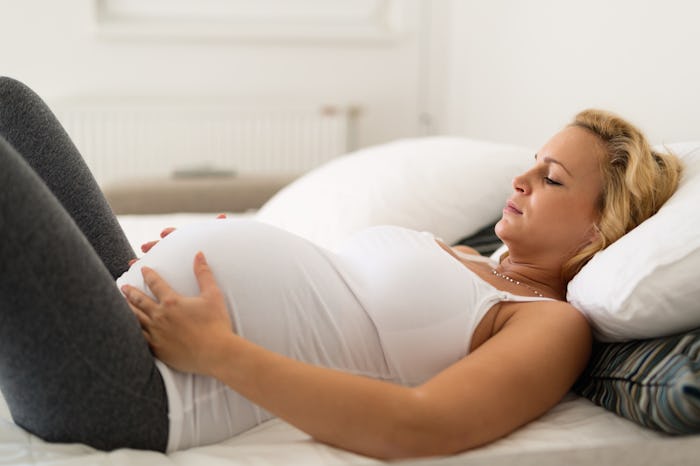Pregnancy

If You're Hoping Your 3rd Tri Constipation Means Labor's Coming, Here's The Truth
Here's why you're so uncomfortable
In the last weeks of gestation, mothers-to-be often find themselves in the strange position of pregnancy prognosticators, evaluating each tiny fluctuation of their body's processes and deciding whether or not it means the baby is coming. From headaches to nausea to digestive issues, all symptoms are possible signs of oncoming labor to the mom desperate to deliver. One of the more uncomfortable potential manifestations of childbirth is constipation. But is constipation a sign of labor, or is it a more benign symptom of pregnancy overall?
When your body is backed up, the symptoms can be brutal for a pregnant woman. Not only are you already "full" so to speak, when you have additional unwanted weight through the inability to process your body's waste, your body feels like it has run out of room. It's painful, it's frustrating, and the pressure of it can be really confusing because the symptoms so closely mirror those of labor.
But that doesn't mean your baby is on the way. "Constipation is not a sign of labor, but it is a very common symptom of pregnancy," Dr. Jonathan Schaffir, OB-GYN at The Ohio State University Wexner Medical Center tells Romper. "Bowel motility (the speed that stool moves through the gut) is slowed down by the hormones of pregnancy, and more fluid gets absorbed."
The Journal of Obstetric, Gynecologic, and Neonatal Nursing also noted that constipation isn't a sign that labor is imminent, but since it is a common complaint of late pregnancy, that means that it could be a bigger problem around the same time you'd be feeling contractions.
An article in Progress in Nutrition also suggested that constipation in late pregnancy is one of those common symptoms that happens so frequently, it's not even studied that much anymore. It's considered par for the course during the last weeks, and patients are just advised to eat lots of fiber, drink lots of water, and exercise. Researchers wrote that "fetal development in late gestation causes intestinal malrotation." In simple terms, that means that your baby is growing so large that they're rearranging your insides, pressing up against and possibly twisting parts of your digestive tract, slowing things way the heck down.
But there might be a different type of bathroom issue happening before labor. Sutter Health's website noted that all that constipation sometimes ends spectacularly right before you go into labor. The hormones that cause contractions speed up the motility of your digestive process, and the floodgates open.
Schaffir also tells Romper that the "treatment" some pregnant people try to relieve themselves of constipation could entice labor if you're full-term. "To overcome constipation, some women may use laxatives. Although they are not generally effective in inducing contractions, there is some evidence that castor oil in particular may contribute to labor contractions," he says.
I didn't take castor oil, but I've never felt my digestion move at such a quick pace before as I did the day before I had my son. I'd just walked about 11 miles earlier in the day, and after dinner, I felt the initial rumblings. Two hours later I was begging for mercy, or at least for my butt to quiet down long enough for me to get some sleep. I had no idea it was a sign of labor at the time, but when the contractions hit early that morning, I had some clue. When my doctor asked me about the night before — what I'd done, what I'd eaten — she wasn't remotely surprised that my behind was glued to the porcelain throne all night. Thankfully, I was so cleaned out I didn't poop on the table, so I'm calling it a win.
If your constipation is bothering you, or if you think you're quite possibly about to drop a baby in your kitchen when making snacks for your toddler, talk to your provider. They're pretty good at predicting what your poop, or lack thereof, means.
Experts:
Dr. Candice Fraser, OB-GYN with Your Doctors Online
Dr. Jonathan Schaffir, OB-GYN at The Ohio State University Wexner Medical Center
Studies Referenced:
Beebe, K. R., Gay, C. L., Richoux, S. E., & Lee, K. A. (2017). Symptom Experience in Late Pregnancy. Journal of Obstetric, Gynecologic & Neonatal Nursing, 46(4). Retrieved from https://www.sciencedirect.com/science/article/pii/S0884217517302575
Zahoor, S., Babar, M. E., Javed, M. M., & Hussain, T. (2018). Constipation in pregnancy: causes and remedies. Progress in Nutrition, 20(1-S), 305-311. https://doi.org/10.23751/pn.v20i1-S.5788
This post was originally published on Sep. 25, 2018. It was updated on Sep. 6, 2019. Additional reporting by Samantha Darby.
This article was originally published on